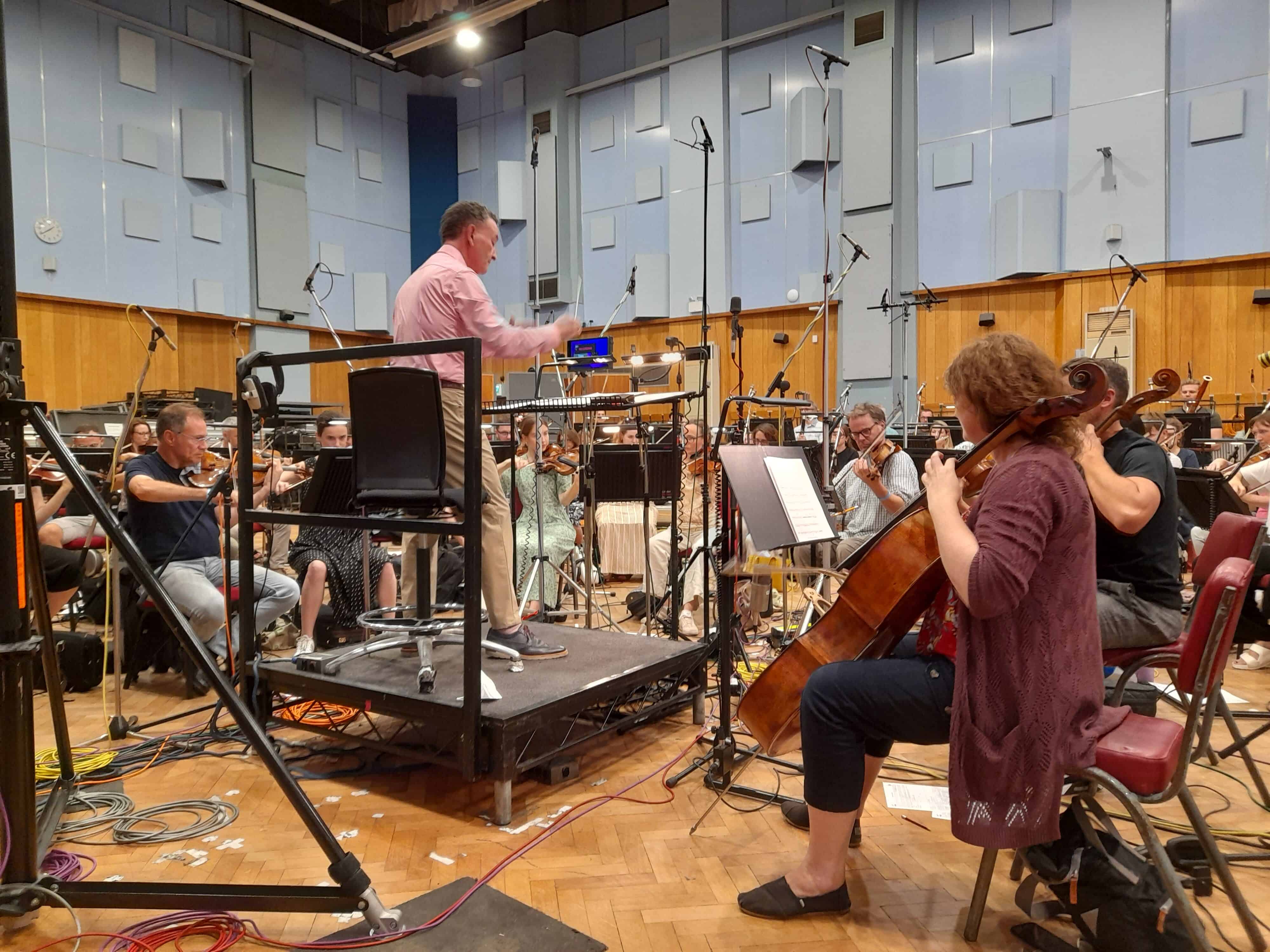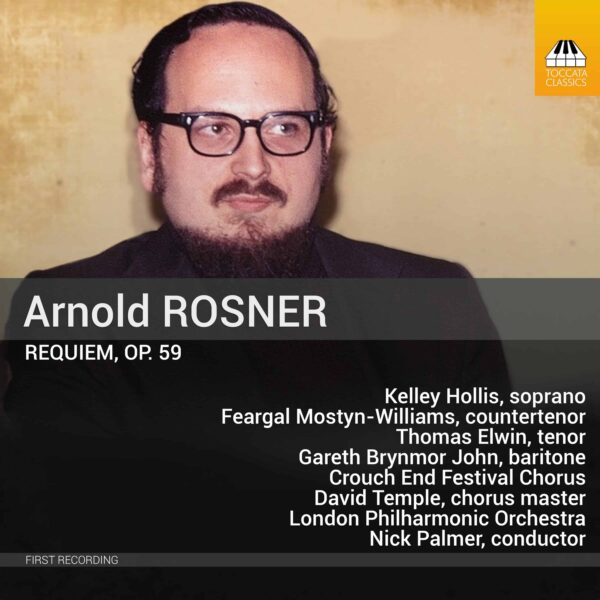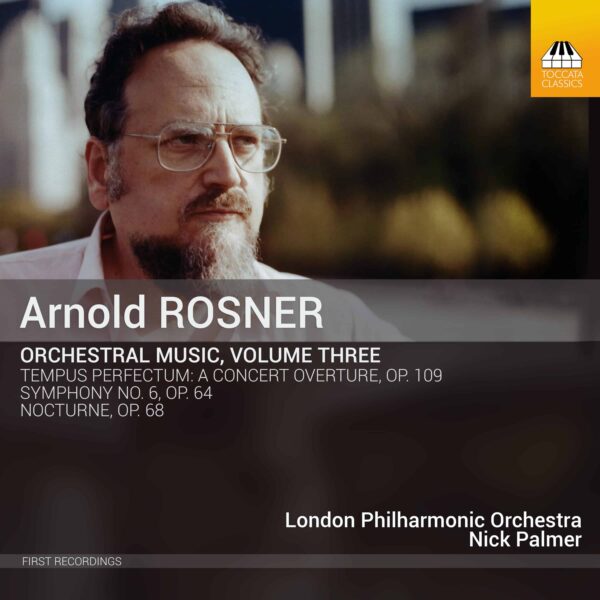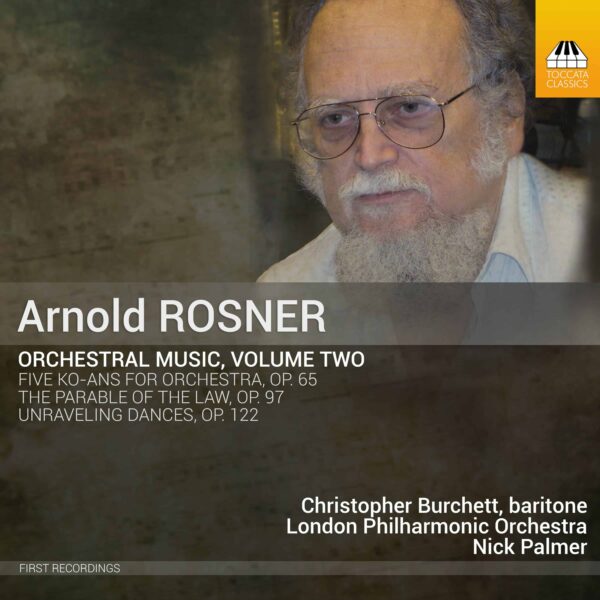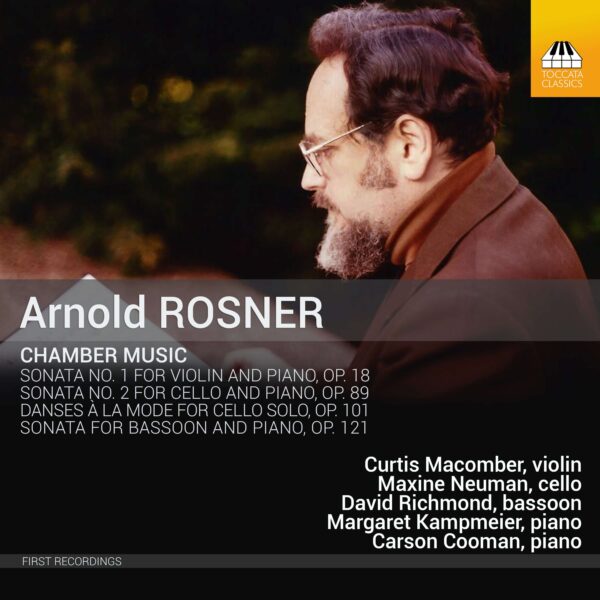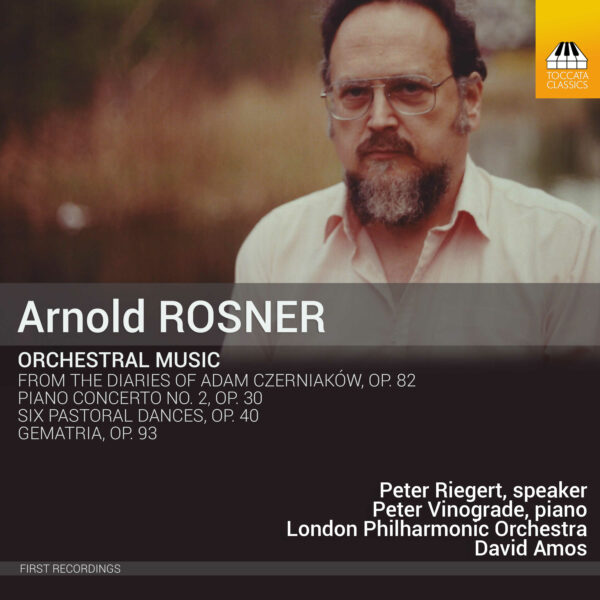There are now five volumes of the music of the New York-based Arnold Rosner (1945–2013) on Toccata Classics: three of orchestral music, one of chamber works and his monumental Requiem of 1973 – an astonishing achievement for a 28-year-old. Each of those three orchestral albums featured at least one work of striking power: for Vol. 1 (TOCC 0368) it was From the Diaries of Adam Czerniaków, Op. 82, for narrator and orchestra (1986); on Vol. 2 (TOCC 0465) you had a choice – either the powerful symphonic suite Five Ko-ans for Orchestra (1976) or Rosner’s dramatic, dark, hieratic setting of Kafka’s The Parable of the Law for baritone and orchestra (1993); and on Vol. 3 (TOCC 0469) the phenomenally powerful Sixth Symphony (also 1976) which, to my ears, is one of the most important of all twentieth-century symphonies. The orchestra in all four of the larger-scale recordings has been the London Philharmonic, conducted on Vol. 1 by David Amos and since then by Nick Palmer (he prefers ‘Nick’ to ‘Nicholas’, apparently).
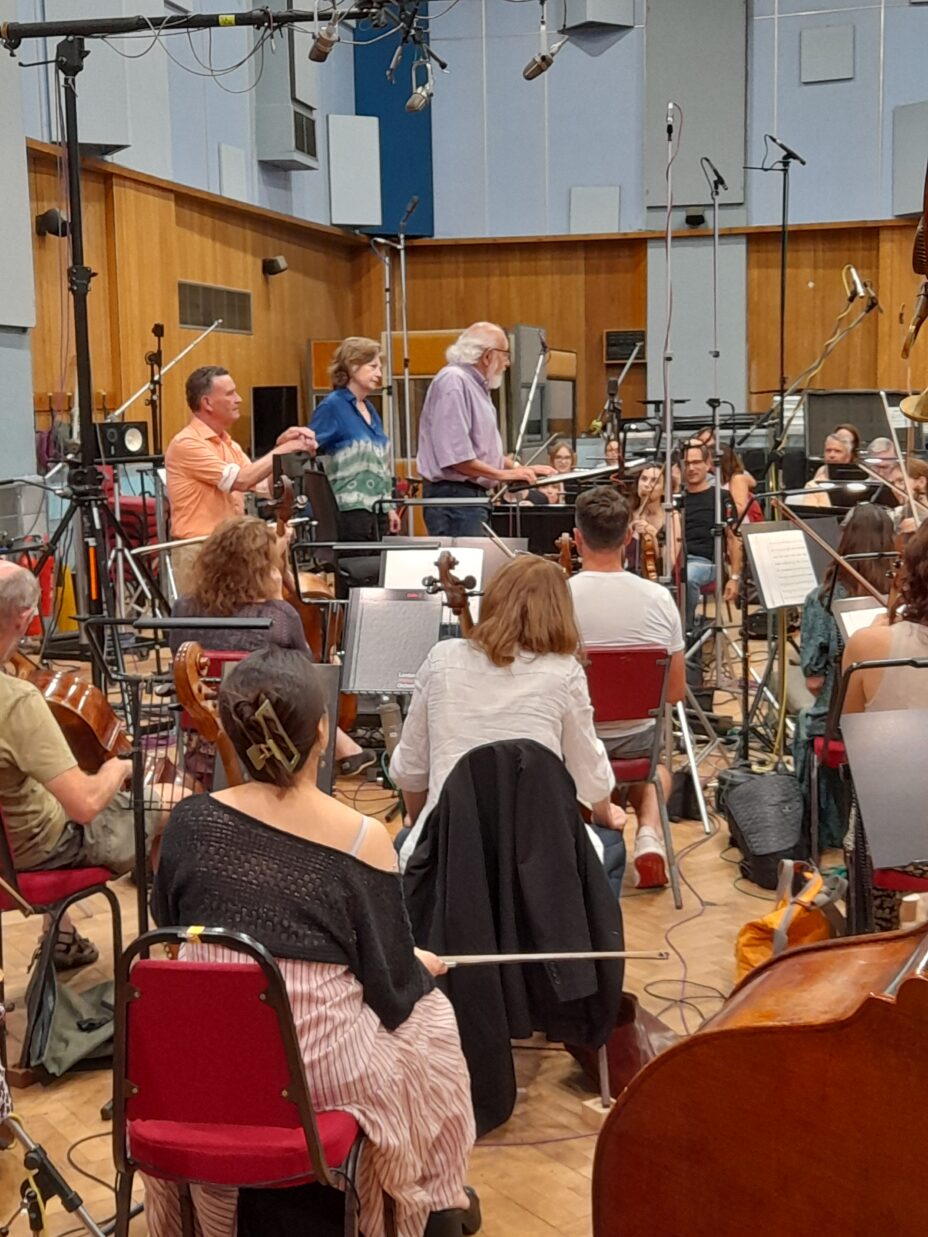
I am delighted to announce that there is now a fifth volume of orchestral music not only in the can but now also in the pipeline: it has been edited and is being prepared for release, when it will become tocc 0710. A few weeks back, I spent a couple of days in the Abbey Road Studios to hear it recorded with the LPO and what we might call the ‘Rosner Team’: Nick P, of course, but also Walter Simmons, the legendary producer and writer and powerhouse behind the recovery of many neglected American composers, the sound-engineer Jonathan Allen and Irene Rosner David, Rosner’s sister and administrator of his estate; the missing member was Carson Cooman, who is a vital cog in the Rosner machinery, not least through his work in establishing top-quality editions of the scores.
In common with the first four volumes, this fifth album has one work in particular that overshadows its companion pieces in sheer power and emotional substance, in this instance Rosner’s A My-Lai Elegy (1971, rev. 1993). Before the first session Irene Rosner David gave the musicians a brief introduction to the music that they were going to be playing and asked them how many of them had heard of My-Lai. To me astonishment only three hands went up, of the eighty or so souls assembled in the studio. My Lai was the scene of the worst massacre of Vietnamese civilians during the Vietnam War – the worst known, perhaps, since the US authorities, from Nixon down, went to considerable lengths to try to hush-up what happened at My Lai on 16 March 1968, when around 500 civilians – old men, women and children – were slaughtered by US soldiers. The ghastly, gory details can be found in this Wikipedia article. Given that the behaviour of the troops at My Lai showed close parallels to that of the Nazis Einsatzgruppen death squads, which went from town to village in eastern Europe murdering the local Jews, it is hardly surprising that when the news of the My Lai massacre became known, about a year and a half after the event, civilised opinion in the western world was appalled. Arnold Rosner’s response was A My-Lai Elegy, which has few rivals in its sustained intensity, his anger, his outrage expressed with a physicality that brought up the hairs on my neck – I was sitting in the studio for the recording, just a couple of yards off the front desk of the cellos. Towards the end of the Wikipedia article there’s a section on cultural representations of the massacre which makes no mention of Rosner’s composition – when tocc 0710 comes out, that paragraph will have to be revised.
The recording sessions opened with the Scherzo from Rosner’s Fourth Symphony of 1964, so roisterous and engaging that I asked Walter Simmons why the entire symphony wasn’t down for attention here. He patiently explained that, since Rosner wasn’t even twenty when he wrote it and had not yet had any formal instruction in composition, the other movements wouldn’t do much to enhance his reputation – an important consideration in such circumstances: you don’t much help an unfamiliar composer by putting weaker works before the public. During those two days I heard Walter just as patiently offer the same explanation to other people repeating my question – until someone suggested: ‘Why not just call it “Scherzo for Orchestra”? That will stop everyone asking what happened to the rest of the symphony’. And so Scherzo for Orchestra it has now become.
The other three works recorded for the new album are the Canzona Secundi Toni (1975), where Rosner’s modal harmonies ring out with the glorious resonance of a full orchestra brass section; the Concerto Grosso No. 2 (1979), which shows a rather more ascetic side to Rosner’s musical personality, perhaps with hints of Hindemith and shades of Sessions, but still expressed in his unique voice; and the Variations on a Theme by Frank Martin (1996). I knew Maria, Frank Martin’s widow, when she was in her mid- to late eighties. Her energy, which conceded nothing to her age, mixed with considerable personal warmth and an unfussy, matter-of-fact approach to life to make her terrific company and a formidable exemplar of that classic character, the ‘composer’s widow’. She was indeed dedicated to the memory of her husband, and she would have been beside herself with pleasure to have heard this rich and resourceful tribute to her husband. Rosner dedicated it to Max Schubel, the head of Opus One Records, who had acted as a guide for Martin during a visit to NYC in the early 1980s. The theme is from Martin’s hour-long Die Weise von Liebe und Tod des Cornets Christoph Rilke (1942–43) – Der Cornet for short – based on a poem by Rainer Maria Rilke set for alto and orchestra. The Canzona Secundi Toni, BTW, will be on the digital album only: including it on the CD would have taken us to a total timing of 89:56 – 26 seconds over the carrying capacity of a compact disc.
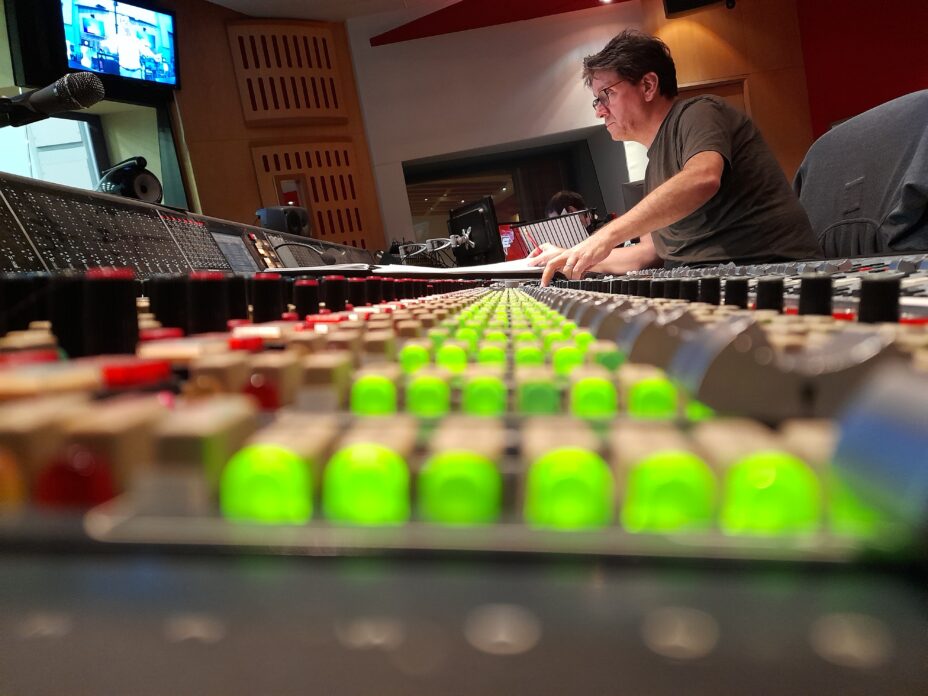
The set-up in the control room saw Jonathan Allen sitting in front of a vast spread of lights, knobs and levers on the panel in front of him, checking levels and the like and occasionally staring out through the window into the studio like the captain of a ship trying to read the sea. Behind Jonathan sat Walter, with the score being recorded spread on the table before him. Every so often one of them would say something like ‘We can’t really hear the bassoons in bar 283’, and Nick Palmer would be asked to retake it, and, as relaxed as Buddha on a morning walk, he would calmly ask the orchestra to play it again. Once one tricky passage had required take after retake before Walter and Jonathan were happy, I asked them: ‘Is Nick always as easygoing as this, or has he ever snapped and said “Oh, ferchrissakes, you’ve had it four times already”?’ ‘No’, Jonathan answered, ‘’this is as angry as he gets.’
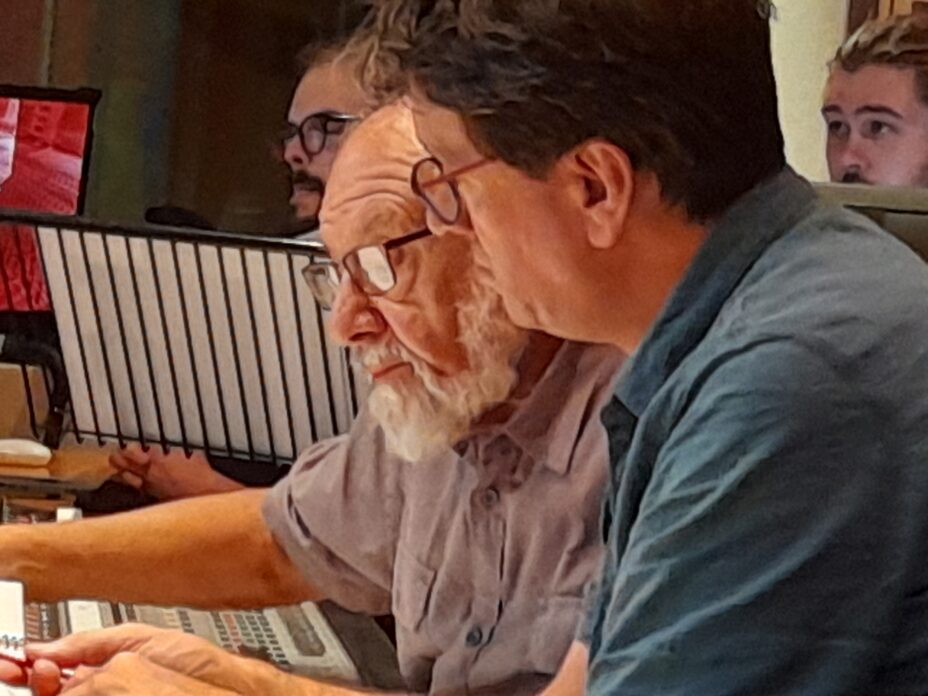
It wasn’t only a question of self-control, either: I didn’t notice a bar when, wherever Walter and Jonathan dropped him back into the score, he wasn’t in complete control of the music, not a single stumbled beat; instead, his gestures were a model of clarity, giving the musicians the information they required. The LPO players for their part didn’t need much more than a play-through to nail a passage second time around. London orchestras have the reputation of being able to play anything you in front of them, no matter how complex, and it’s always thrilling to see that accomplishment in action.
I wouldn’t like to rank our Rosner orchestral albums to date: after all, each has something unique to offer. But the sheer power of the music on this next instalment might well make it the best yet.
